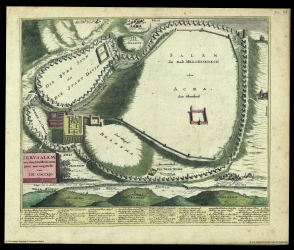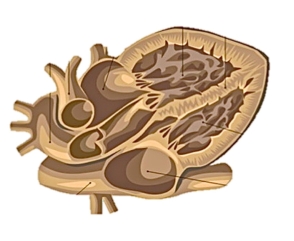An example of a heart’s perception of the geography and spirit of Jerusalem is illustrated in the map on the left, an imaginal representation of Jerusalem from 1712.
Given the imaginal as a valuable and meaningful field of experience, this inquiry pays close attention to the image of the heart, so strongly linked to Jerusalem. Jerusalem has been often perceived as the heart of the Israeli-Palestinian conflict, as well as the city at the heart of the conflict. Images relating Jerusalem to the heart can be found in the media, in pop culture, and in literature. Examples include the album “Jerusalem in My Heart” (1992) by Lebanese singer, Fairouz, Jerusalem’s Heart (Thoene, 2005), “Jerusalem, Heart of the Matter” (Katz, 2006), “Jerusalem, the Beating Heart of the Conflict” (Euronews, 2007), “Jerusalem and the Modern Heart” (Fatherstephen, 2008), “in Jerusalem tiny Hearts Still Beat for Peace” (DestinationSante, 2009), and “Jerusalem: ‘Heart of the Volcano’ and Key to Peace” (Latin Patriarchate, 2010).
The perception of Jerusalem as the national heart comes to life in the fight of both Israelis and Palestinians to make Jerusalem their capital. In 1980 the Israeli government passed The Jerusalem Law declaring, “Jerusalem, complete and united, is the capital of Israel” (Israel Ministry of Foreign Affairs, 1980). This law expresses a popular and powerful national feeling that, as Elie Wiesel asserted, “Jerusalem is the heart of our heart, the soul of our soul” (The Elie Wiesel Foundation, n.d.). Jerusalem is also the proclaimed capital of the Palestinian National Authority. Recognizing the claim of many Palestinians and non Palestinians that “East Jerusalem is Palestine’s historical, spiritual and commercial heart” (Jews for Justice, n.d.), Palestinian Prime Minister Salam Fayyad said, “The Palestinian state will be established in the West Bank and Gaza, with Jerusalem as its heart” (Daraghmeh, 2010).
In The Thought of the Heart & the Soul of the World (1982), Hillman contemplates the image of the heart saying that our work is “to rediscover the heart…in its exile, in an imagination which Corbin calls ‘captive’, where the thought of the heart has become adulterated in our contemporary heart disease: sentimentality of personalism, brutalism of efficiency, aggrandizement of power, and simple religious effusionisms.” (p. 4) This task of “rediscovering the heart” in its captivity, in exile, is the driving force behind this study. Instead of offering answers, this work is part of a quest, an opening question, for the rediscovery of our heart and the heart of our neighbor. “Jerusalem is not a place to find answers but it is a place of questions” (Infeld, personal communication, 2007). What is our experience of this suffering, divided, and broken heart? A heart that nonetheless can be also inspired, courageous, and available to be touched.
The heart in this study is not only an image for contemplation but also an organ of perception. We bring our attention to places in Jerusalem and get to know them again, through our experiences and the experiences of others. Paying attention, if we dare to open and really listen, is a caring act of the heart. The Hebrew expression for paying attention being Lasim Lev, to place our heart, illustrates it. It reminds us of the crucial role our hearts have in the act of listening attentively and intently to those places where suffering is experienced. In this study we bring our attention, we place our hearts in the movements between place, neighbors, and experience.
What might take place when we contemplate the personal and cultural heart, the physiological and ecological heart, through the “thought of the heart”, its imaginal field, and power? Can the unforeseen and unexpected take place?
The following song, titled “Bukra Fi Mishmish (Arabic for “when pigs fly” or for when the impossible happens) is one response to this question. It was recorded in Jerusalem, by HEARTBEAT, an international community of musicians, educators, and students using music to build mutual understanding and transform conflict. Founded in 2007 under a grant from Fulbright and MTV, Heartbeat empowers Israeli and Palestinian musicians by creating opportunities and spaces for musicians from both sides to work together, hear each other, and amplify their voices to influence the world around them.



